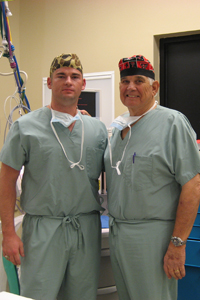Thank a Nurse Anesthetist This Week

Nurse anesthetists like Stevenson and his grandfather play a crucial part in health care.
If you have ever undergone medical, dental or obstetrical procedure, chances are you’ve come into contact with a nurse anesthetist (\-ə-ˈnes-thət-əst), or advanced practice nurse with graduate-level education and board certification in anesthesia.
In fact, certified registered nurse anesthetists (CRNAs) have been the main providers of anesthesia to U.S. military personnel on the front lines since WWI, including current conflicts in the Middle East, according to the American Association of Nurse Anesthetists. Nurses first provided anesthesia to wounded soldiers during the Civil War.
Joshua Stevenson, CRNA, MSNA, chose to follow in his grandfather’s footsteps and become a CRNA. He said his grandfather began practicing in the 1970s and still works today.
“I chose to become a CRNA because I love the challenge and the science involved with the practice of anesthesia,” Stevenson said. “I absolutely love my job and the daily responsibilities it requires.”
Stevenson graduated from the School of Nursing in 2006 with a bachelor’s in nursing. He then worked in the pediatric intensive care unit at Cook Children’s Hospital in Fort Worth until he began CRNA training in 2008. Stevenson now works for the Department of Anesthesiology.
In addition to administering prescribed anesthetics, nurse anesthetists like Stevenson and his grandfather, are trained to monitor the patient’s vital signs and communicate the information to the physicians. They also perform other tasks during these medical procedures, such as inserting artificial airways, administering oxygen and preventing surgical shock.
“CRNAs are the primary providers of anesthesia in rural and underserved communities and manage the anesthesia needs for millions of patients annually,” Stevenson said. “Like their physician counterparts, the demand for certified registered nurse anesthetists will continue to rise as the population ages and expands and as more outpatient clinics and nontraditional settings require their services.”
National Nurse Anesthetists Week is Jan. 22-28. Learn more about this growing profession.
Related Stories
Celebrating Veterans: TTUHSC’s General Martin Clay’s Legacy of Service and Leadership
From his initial enlistment in the Army National Guard 36 years ago to his leadership in military and civilian health care management roles, Major General Martin Clay’s career has been shaped by adaptability, mission focus and service to others.
Texas Tech University Health Sciences Center School of Nursing Named Best Accelerated Bachelor of Science in Nursing Program in Texas
The TTUHSC School of Nursing Accelerated Bachelor of Science in Nursing (BSN) program has been ranked the No. 1 accelerated nursing program in Texas by RegisteredNursing.org.
TTUHSC Names New Regional Dean for the School of Nursing
Louise Rice, DNP, RN, has been named regional dean of the TTUHSC School of Nursing on the Amarillo campus.
Recent Stories
The John Wayne Cancer Foundation Surgical Oncology Fellowship Program at Texas Tech University Health Sciences Center Announced
TTUHSC is collaborating with the John Wayne Cancer Foundation and has established the Big Cure Endowment, which supports the university’s efforts to reduce cancer incidence and increase survivability of people in rural and underserved areas.
TTUHSC Receives $1 Million Gift from Amarillo National Bank to Expand and Enhance Pediatric Care in the Panhandle
TTUHSC School of Medicine leaders accepted a $1 million philanthropic gift from Amarillo National Bank on Tuesday (Feb. 10), marking a transformational investment in pediatric care for the Texas Panhandle.
Texas Tech University Health Sciences Center Permian Basin Announces Pediatric Residency Program Gift
TTUHSC Permian Basin, along with the Permian Strategic Partnership and the Scharbauer Foundation, Feb. 5 announced a gift that will fund a new pediatric residency.
